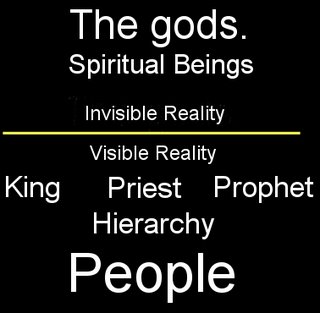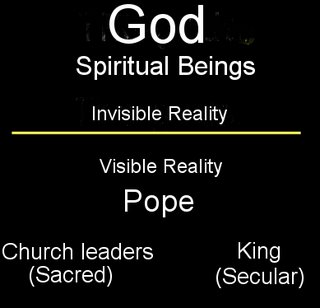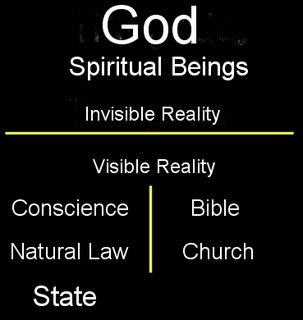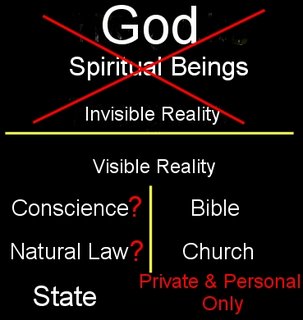Congress shall make no law respecting an establishment of religion, or prohibiting the free exercise thereof; or abridging the freedom of speech, or of the press; or the right of the people peaceably to assemble, and to petition the Government for a redress of grievances.
The background of this foundational amendment of US law was the situation in the England which was itself a hangover from the Medieval struggles between the Pope and the Emperor. This was a struggle for understanding the right view of authority.
The Medieval Church view attempted to Christianise the essentially pagan view of authority and law with the Pope above the emperor.


In England during the reformation the King was substituted for the Pope and the church was the state with the King or Queen as its head. Religious heterodoxy was disloyalty to the sovereign. Many early settlers in the New World had struggled between their loyalty to their own consciences and their views of sovereignty and their loyalty to the state in which they were born. They had suffered from serious persecution as a result. They did not want to repeat the experience! Hence no established church! However because of their background it seems probable to me that most of them had a view of authority like the one shown below:
Separation of church and state.

The culture war which is currently raging and of which the Dover battle was a manifestation is the struggle about the top part of the diagram.
The atheistic social contract model of authority talks about the separation of church and state but it actually means something entirely different:

14 comments:
Evidence of design is not evidence of a supernatural designer.
I agree - here in this post I was looking at the background to the estalishment principle in the US constitution... this does have to do with God and Dover!
However the conclusion that intelligence is prior to physical life is science but does have religious implications.
Your charts are entertaining, but inaccurate. In shortform, let me lay out for you how James Madison viewed the structure:
People
___________
Government
As Jefferson wrote in the Declaration of Independence, "just governments" derive their authority from the consent of the governed. Madison enshrined that in the Constitution.
Where is the role for God? That's a separate chart, when and if it applies:
God
______
People
Church and state are not on the same organization chart. That's the way the U.S. government is structured. Now, some people will argue that all governments are established by God -- it's an entertaining argument. In the U.S., if God wants to get the government to do something, God speaks to a sufficient majority of the people and it happens.
Which is the real difficulty with ID and teaching it instead of science: God hasn't asked that we teach ID. When people, even well-meaning people, get in the way of the structure of government, and try to insert the structure of church instead, they generally run into difficulty. That's what happened at Dover.
The irony, of course, is that it's those who don't listen to God who insist they're doing God's bidding. They lose in court, they lose in elections, they lose in laboratories, they lose in medical care. How many ways must God make the point to them before they see the light?
In 1812, President Madison signed a federal bill which economically aided a Bible Society in its goal of the mass distribution of the Bible.
Note that President Madison signing a bill authorized by congress to pay for the distribution of Bibles. The judicial interpreation that exist today has therefore over stepped its boundaries of the original founding father you deem would not such an act. Nor would Madison approve the judicial tyranny of today.
You can nitpick items all you want. The truth is the founding fathers of our nation did not want one specific denomination such as the Church of England to be established.
But, most importantly, they whole heartedly participated in the distribution of bibles paid for by taxes.
And they did this with the full acknowledgement and encouragement for children in school to btw learn from the bible.
The later judicial intepretation that the establishment clause somehow relates to removing prayer or even discussion of the bible, God or any subject matter from public institutions is fully and totally without merit.
Good try though....
Andrew:
What "evidence of design"? The ID expert witnesses in the Dover trial were forced to admit that they had no positive evidence of design beyond their bald assertion of a "purposeful arrangement of parts".
Also, how does a view that contains "God" in it (and is thus explicitly monotheistic) maintaining seperation of church and state? This view would seem to explicitly exclude polytheistic, pantheistic and non-theistic religions, in addition to atheism. To be fully inclusive, it would need to replace the entire "invisible reality" area with a message saying "put your own view of the supernatural here".
Michael,
I can't find any such law that Madison signed, in 1812, or ever. Your description of the law suggests it would have been high veto-bait for Madison. Have you a citation on the law?
The founders almost always rejected the idea that the government should distribute Bibles. It was against their prinicples. You're making an extraordinary claim. I'd like some evidence.
Anonymous,
1. This post is not about evidence for ID so I am not sure of the context of your argument.
2. The church & state issue arose from within "Christendom" it concerns the relation of the explicitly Christian Church with the state. This post was about my understanding of the background historically to the Establishment Clause. The argument originally assumed the truth of Christianity.
Ed,
"Entertaining but inaccurate"
I was not attempting to give Madisons views in any of the diagrams. I was merely endeavouring to clarify the background to what is meant by the establishment of a religion.
It would be helpful to me if you could specify what the inaccuracies are.
Tim,
You have completely misunderstood my post. It was about the establishment clause and its historical context.
I was not talking about science here at all.
It is the social contract model of authority which I maintain is atheistic.
Well, if you're trying to say anything at all about the separation of church and state in the U.S., Andrew, I can't begin to tell you how many different ways you're off track. Madison's view -- which is the prevailing legal view and that held by most Christians in the U.S. -- is that God talks to people, not to government. Government is never the mediary between God and anything. Government is established to secure liberty, including the freedom of worship. Some faiths, such as the Latter-day Saints, believe the U.S. government to be divinely inspired, a view probably not too far from what Franklin thought, and consistent with the actions of Jefferson, Madison and Washington, among others. Citizens act on both sides of the "wall," at the choice of each individual citizen.
So, your diagrams are entertaining, but they convey nothign close to the actual relationship of people to government, people to their faith, people to their god or gods, or government to faith or gods.
You restrict the background of our religious freedoms to England's history, which ignores the history here in the U.S. and the very real influences of the history of France and the rest of the world. Simply stated, what we got from England was the observation that under any marriage of church and state, no one was safe: When the Catholics ruled, the Protestants went to the gallows or chopping block; when the Protestants ruled, the Cactholics were put to death. Even in our earliest attempts at theocracy, we discovered that religious rule generally failed -- the group who settled at Plymouth, aboard the Mayflower, first drew up a pact that united the 30 or so religious refugees with the 70 or so non-refugees under a government that they created in order to secure their freedoms and rights, against each other as much as anyone or anything else. The Mayflower Compact says that individuals in both groups agreed to fairly create a government which would make laws fair to all, and that individuals agreed to obey the fair laws.
Whose side was God on? It doesn't matter.
One of the chief problems with creationism and ID is that they are unfair to reality and to anyone who has a stake in reality-based science. If you want to dissect U.S. law, start with the idea that we strive for fairness rather than with the idea we strive for some relationship with God. The latter view will most often lead one's analysis astray.
Under our law, an establishment of religion is any time any governmental entity engages to tell a person when to pray, where to pray, how to pray, what to pray for, or to whom or what to pray. Intelligent design, being a product of a minority Christian view, runs afoul of the when, where, how and to-whom-or-what restrictions.
If you're not trying to give Madison's views, you're not working for accuracy. If you want Madison's views in full, look the Memorial and Remonstrance (http://religiousfreedom.lib.virginia.edu/sacred/madison_m&r_1785.html), a petition he drew up in opposition to the only attempt to re-establish religion prior to 1945, and the Virginia Statute of Religious Freedom (http://religiousfreedom.lib.virginia.edu/sacred/vaact.html), Thomas Jefferson's proposal which was passed as a result of Madison's petition, and which is still the law in Virginia, and which is the legal foundation of our First Amendment.
Ed,
Thanks for your comment.
What do you make of this quotation from Madison:
"It is the duty of every man to render to the Creator such homage and such only as he believes to be acceptable to him. This duty is precedent, both in order of time and in degree of obligation, to the claims of Civil Society. Before any man can be considerd as a member of Civil Society, he must be considered as a subject of the Governour of the Universe: "
Do you consider that Madison bases the obligations imposed within a civil society upon the obligations first imposed by the "Governor of the Universe"?
Andrew,
Notice that Madison puts the obligation squarely and solely on the person in dealing with God -- there is no role for government. Not only is there no role for government in that relationship, neither is there any role for the church in government.
Read it again, slowly. Pause on the word "only," and consider what it means in that context.
Now go back and read that quote in context -- in the place where Madison most forcefully and completely makes the argument that church and state must be separated both to ensure freedom and to protect the church: http://www.law.ou.edu/ushistory/remon.shtml
Madison did not believe it the duty, obligation or privilege of any person to rule on whether another human could participate in government on the basis of the second person's religious beliefs. It is the duty of men individually to make peace with God, and not the duty of government to consider whether any citizen has done so, or how any citizen has done so.
Ed,
It was especially these words that I wanted you to focus upon:
"Before any man can be considered as a member of Civil Society, he must be considered as a subject of the Governor of the Universe: "
That is a radically different view of the separation of church and state from the atheistic social contract model.
Presumably you think Madison was completely offbeam here.
No, Madison was right on. Madison also said that I have no right to insist you comply with my view of what one has to do to be subject to the Governor of the Universe. I can't disqualify you from participation in this discussion merely because your theology is unorthodox.
Madison well understood that good government works best with angels, but that all governments are composed instead of men. It's an ideal that people make peace with God first -- but to form governments among men to secure rights, including religious rights, we must assume that all participants have done so, on their own terms. It is not the duty of government to question those particular bone fides.
Experience shows that such queries are often done incorrectly, on the wrong criteria. Government isn't about the salvation of the soul, it's about filling the potholes in the streets.
Eh! "bonA fides"
Post a Comment